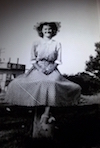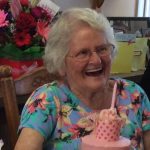submitted by Bronwyn Patton and Wendy Patton
Responses from Jean Patton to questions from a Granddaughter (2016)

1. What sorts of things did you learn when you were in school?
- The three Rs as they were then called – Reading, Writing and aRithmetic. We had no tv or computers in those days, and very few books in the house. Having books was not something as common as now, buying them was for rich people. So when I started school, I started to learn basics, the alphabet, reading, sums etc.
- How was your school different from school today?
- We started school knowing less than kids do today. We had a slate and a slate pencil. This was a little bit like a small blackboard and when we wrote on it, we could rub it off with a rag. There were some books in the school which we got for reading but only at school. We were not allowed to take them home.
- I only went to grade 6 at school and then I went out to work in a factory with my grandmother. These were depression years and families did not have much money. A lot of people were unemployed and going to, and staying at school was considered a luxury. I was 11 when I started work and I earned 2 and sixpence a week, about 25cents. That was a lot of money in those days.
In many ways, these words epitomise our mother. She had limited formal education, worked hard all her life and did so with no sense of regret or desire for more (for herself). While she did share the value of hard work with her family, she was also committed to the value that her daughters (and sons) would have as much education as they wanted to. She did not want us to have the same hard life that she had lived, while at the same time, acknowledging that she did not regret it and that “she simply did what she had to”.
Frances Jean Patton (Jean) was born on 16 August, 1929 in country Victoria (Australia). Her sister, Dawn, was a year old at the time of her birth, a relationship and friendship which was important to both of them through their lives. Jean never knew her biological father and was a teenager before she realised the man she knew as her father was her stepfather. It made little difference to her as he had been and always would be regarded as her dad. The family (which now included a younger brother, David) moved to Richmond, Victoria, when Jean was seven (7), a very different environment for the children.
Leaving school at 11 is unbelievable in these times, as is the hard and heavy work she did as a young woman, eventually becoming, at 16, a manageress for a dry cleaning firm. Jean learned early the importance of being careful with money, something which she came to rely on during the upbringing of our family.
At the age of 23, our mother met our father, Cyril, who had ‘wandered’ to Melbourne after returning from active service in World War 2. They quickly realised that they were destined to be a long term liaison. They were married in June 1953 and moved to Mackay in North Queensland soon after. The train journey from Melbourne to Mackay was “3 long days and 3 long nights” especially as Jean was ill for much of the time, pregnant with her first daughter.
In the space of just under 18 months, Jean had resigned a responsible position, moved from her home and city environment, had a child which involved considerable stress (Julie had been born 3 months premature, weighing only 2 pounds and measuring 10 inches at birth) and then bought a house. Coping with these changes was to become good preparation for their life to follow.
This set the pace for the next 20 years. Nine (9) children were raised, not including various foster children and long term placement of extended family members. The family experienced periods of unemployment, low income, some ill health and sadness yet through it all, Jean encouraged her children, the first six (6) of whom were daughters, to believe in themselves, to work hard at school and to look for extended education opportunities. She was determined that she would give her children increased life chances and particularly recognised that her daughters needed to be encouraged and supported to have more options than she had.
The following 20 years saw the family growing. Grandchildren were born and as their mothers returned to work outside the home, Jean took on the caring role, again supporting her daughters to pursue a life that they wanted, rather than what was expected of them. Daughters such as those who were pregnant before they married, one lesbian and one who has never married despite being in a long term heterosexual relationship all received abundant love and support, again respecting and encouraging their individual choices.

The next 20 years (yes it keeps going) now include the introduction of great-grandchildren and the support, love and encouragement continue. At 88 (2017), our mother is now in relative ill health and physically impaired, but she is still there for the generations that began with her. Jean’s daughters’ professions include an Assistant Principal, a Community Care Nurse, an Emeritus Professor, a Hospital senior ward clerk, a hairdresser/business manager and a long term senior public servant, jobs that Jean would never have aspired to, but she knew her daughters could and should have more options. As importantly, they are in loving relationships.
As daughters, we can look to our mother and honour the love she has given us. As feminists, we can recognise that she encouraged us to be independent, to be individuals, to have some life that we could call our own.
